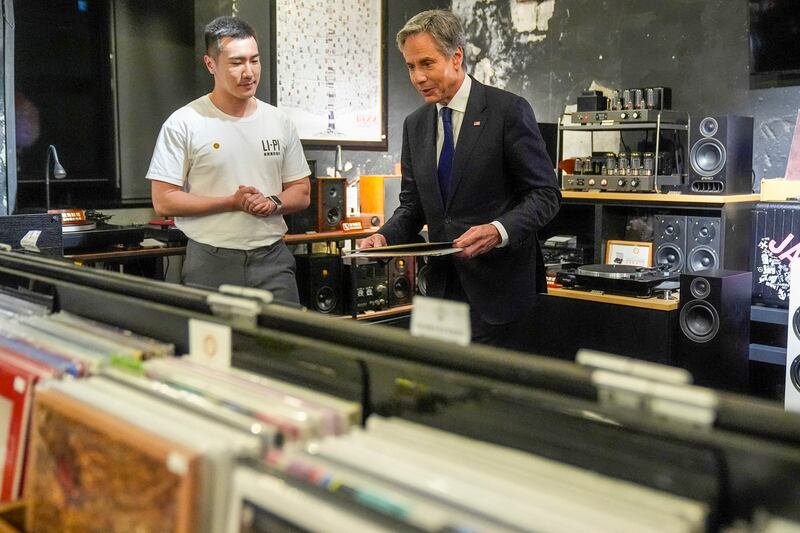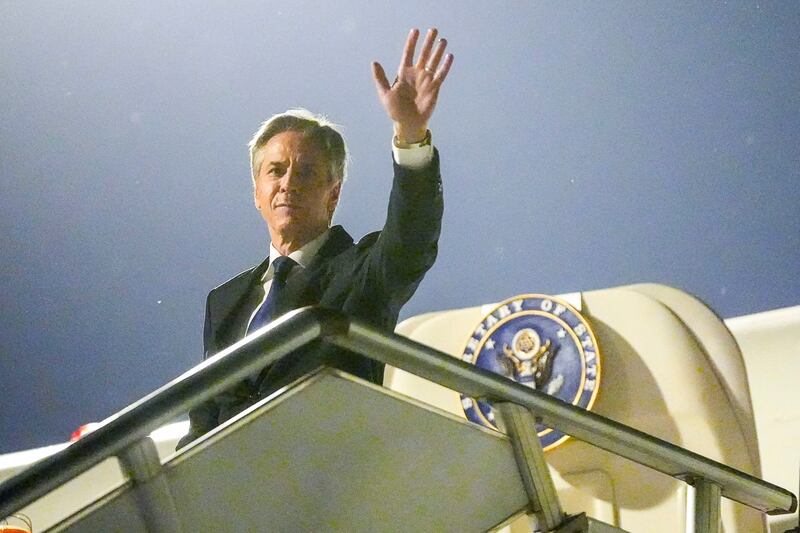U.S. Secretary of State Antony Blinken wrapped up a three-day visit to China on Friday with talks with President Xi Jinping and a vow that the recent dialogue between the rival powers was reducing the risk of “misunderstanding and miscalculation” that could cause conflict.
But the final stretch of the trip was not without drama.
Chinese Foreign Minister Wang Yi earlier warned ominously of a "downward spiral" in bilateral ties amid a series of disagreements, and Xi told Blinken during talks in the cavernous Great Hall of the People that the countries "should be partners rather than rivals."
The 45 years of official diplomatic relations between the United States and the People’s Republic of China showed the two countries should “honor words with actions rather than say one thing but do another,” Xi said in remarks to the press before his meeting with Blinken.
“China is happy to see the confident, open, prosperous, and thriving United States,” Xi said. “We hope the United States can also look at China’s development in a positive light.”
“This is a fundamental issue that must be addressed – just like the first button of a shirt that must be put right – in order for the China-U.S. relationship to truly stabilize, improve, and move forward,” he said.
With friends like these
Blinken's trip was marked by a number of key policy differences, most prominently including American complaints about Chinese support for Russia's defense industrial base, and Beijing's subsidization of export industries that U.S. officials say are harming American competitors.
Hours after the top American diplomat arrived in Shanghai on Wednesday, U.S. President Joe Biden also signed into law a bill that could force China's ByteDance to sell TikTok within the next year, a move that Xi brought up with Biden in a phone call this month.
Speaking after meeting Xi, Blinken said TikTok “did not come up.”
But he said he did again raise with the Chinese president the U.S. worries about China’s “industrial overcapacity,” and also “reiterated our serious concern” about the support for Russia’s war in Ukraine.
"Russia would struggle to sustain its assault on Ukraine without China's support," he said, calling China the top supplier of machine tools, microelectronics and nitrocellulose to Russia's defense industry.
“If China does not address this problem, we will,” Blinken said. “We’ve already imposed sanctions on more than 100 Chinese entities, export controls, etc. As before, we are prepared to act to take additional measures, and I made that very clear in my meetings today.”

Speaking to CNN in Beijing, Blinken also said he had raised "evidence of attempts" by China "to influence and arguably interfere" in the U.S. elections scheduled in November, which will pit Biden against former President Donald Trump and could change control of Congress.
“Any interference by China in our election is something that we’re looking very carefully at and is totally unacceptable to us,” he said, “so I wanted to make sure that they heard that message again.”
‘Downward spiral’
In the lead-up to and during Blinken’s trip, Chinese officials had repeatedly defended the exports to Russia, arguing that Beijing had every right to trade with its ally and noting that China was not providing any weapons to Moscow like the United States is to Kyiv.
The disagreements appear to be rocking the uneasy detente that has been in place between Washington and Beijing since late last year.
Prior to Blinken’s meeting with Xi, Wang warned that the growing list of disagreements with the United States could lead to a “conflict.”
The Chinese foreign minister said he was pleased “our two sides have increased dialogue [and] cooperation” since last year’s talks between Biden and Xi, but that China’s “core interests” were being challenged and its development was being “unreasonably suppressed.”
“The negative factors in the relationship are still increasing and building, and the relationship faces all kinds of disruptions,” Wang said. “Should China and the United States keep to the right direction of moving forward with stability or return to a downward spiral?”
The alternative to cooperating on global issues, he said, was to “engage in rivalry and confrontation, or even slide into conflict.”
Long-term process
If Wang’s words seemed like an ominous end to a trip, Blinken did not seem too spooked, hailing the exchange of “candid” dialogue as key to avoiding “misunderstanding and miscalculation” in the relationship.

But then again, Blinken’s trip was never meant to lead to instant successes, said Bonnie Glaser, managing director of the Indo-Pacific Program at the German Marshall Fund of the United States.
Instead, it was a plank in a longer-term process.
“Both sides see Blinken’s visit as an opportunity to communicate their own positions and their own concerns,” Glaser told Radio Free Asia.
“The success of the visit is really going to be determined over time – and of course, it's not just this particular visit, it is all of the interactions taking place between China and the United States,” she said. “We will see over time whether some of the problems can be resolved.”
Edited by Malcolm Foster. Kitty Wang contributed reporting for RFA Mandarin.
